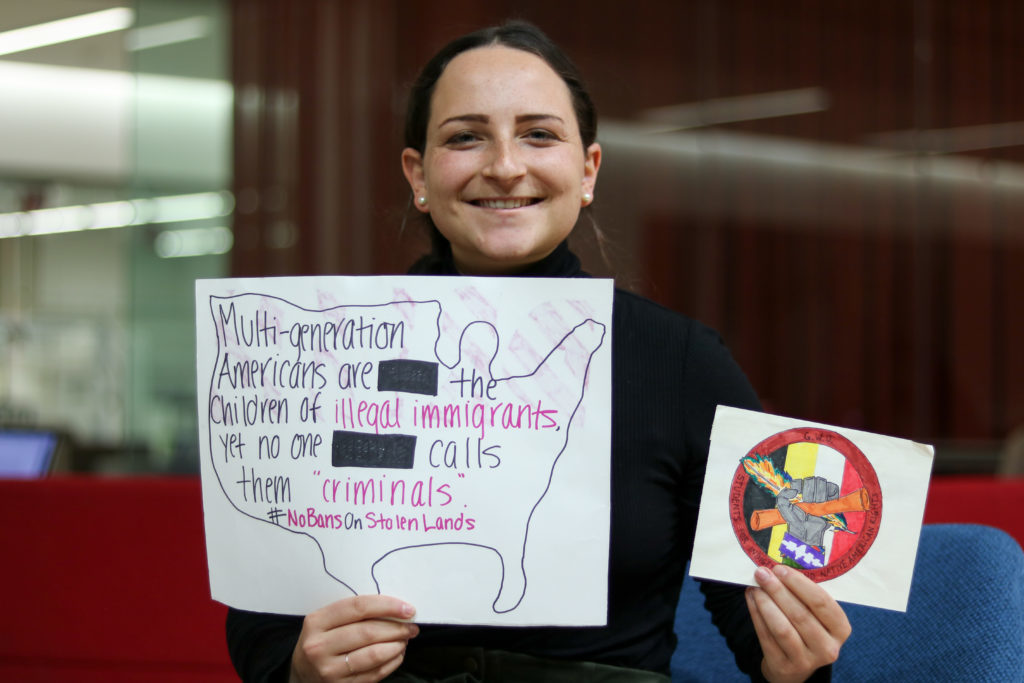A group of students formed a new organization last month focused on education and advocacy for Native American and indigenous peoples’ rights.
GW Students for Indigenous and Native American Rights, founded by co-presidents Gillian Joseph, a second-year transfer student, and junior Annabel LaBrecque, was approved by the Center for Student Engagement Tuesday to become an officially recognized student organization. The group’s leaders said they formed the organization to make students more knowledgeable and respectful of indigenous issues and defend Native American rights.
“GW has done a lot of great work for other minority communities and other environmental causes like that, so it’s time that we include native voices in this pursuit of a more diverse university, a more diverse country and make sure those voices are not only being included but heard very loudly,” LaBrecque said.
About 30 students attended the group’s first general body meeting in District House two weeks ago, days before the organization hosted its first event with Young Progressives Demanding Action Nov. 20, where attendees discussed the “genocidal” history of Thanksgiving. The talk aimed to educate students about how to better approach a holiday with a problematic past, according to the event’s Facebook page.
“We’re real, we’re here and we need help.”
At the group’s first meeting, members exchanged ideas for causes to focus on in the upcoming year, like how to confront environmental racism that leaves racial minority communities exposed to hazardous waste. The group also discussed potentially mounting an effort to change GW’s colonial mascot to a hippo, which has served as the unofficial mascot for years, because of the European colonists’ history of atrocities against Native Americans.
LaBrecque said she began the push to form the group ater GW’s Native American Student Association, a student interest group that provided Native Americans with an outlet to voice their political interests, disbanded due to lack of involvement in October.
“Indigenous Native American voices aren’t really included on campus, and just because Native American students don’t make up a sizable portion of GW’s population, that doesn’t mean that their voices shouldn’t be heard,” she said.
The co-presidents said future events for the organization include a sit-in on Capitol Hill as an act of civil disobedience and discussion panels with experts and activists in Native American and indigenous peoples’ rights.
There are 67 students who identify as “American Indian” enrolled at GW this fall, according to the Office of Institutional Research and Planning.
LaBrecque said she then spoke with other student organizations – like the Progressive Student Union and Young Progressives Demanding Action – and talked with students enrolled in two history classes about colonial America, Pilgrims and Native Americans. Joseph, the other co-president, also reached out to Native American students to recruit potential members through the Multicultural Student Services Center.
Joseph, an indigenous woman whose father belongs to the Lakota tribe, said she sometimes feels hopeless when she talks to people who do not have a basic understanding of indigenous communities, culture and issues. She said education about the oppression of Native Americans and open discussion, which the group aims to provide, would help students understand the prevalence of indigenous communities and their struggles.
“We can actually have allies and people that have our backs and want to understand more about native culture, native rights, native people currently – not just historical relics,” she said. “We’re real, we’re here and we need help.”
Members of the group said they joined because they want to learn more about Native American and indigenous people’s culture, history and issues.
Miles Stepleton, a sophomore and member, said he has always been interested in indigenous peoples’ issues and joined after LaBrecque reached out to his history class and history honor society, Phi Alpha Theta, to promote the organization. He said a focus on how to be a good ally to Native Americans is crucial to sustain the organization because most GW students are not native or indigenous, but allies can work to echo their voices.
“These issues aren’t at the forefront of a lot of people’s minds.”
“I think it’s important to frame the discussions more in terms of ‘what, as non-indigenous allies, can we do?’ and less ‘what do the indigenous need?’” he said.
Native American students were active at rallies last November protesting the election of President Donald Trump and last spring environmental groups and indigenous students supported demonstrations at a reservation in South Dakota against the Dakota Access Pipeline.
Joshua Gomez, a sophomore and member of the group, said he joined out of “common solidarity” with indigenous people to fight against minority struggles he has similarly experienced as a Latino individual.
“These issues aren’t at the forefront of a lot of people’s minds,” he said. “It’s important to have people, most allies and indigenous people, link together to advocate for these issues because they don’t get talked about within our media, within our campus conversations.”





